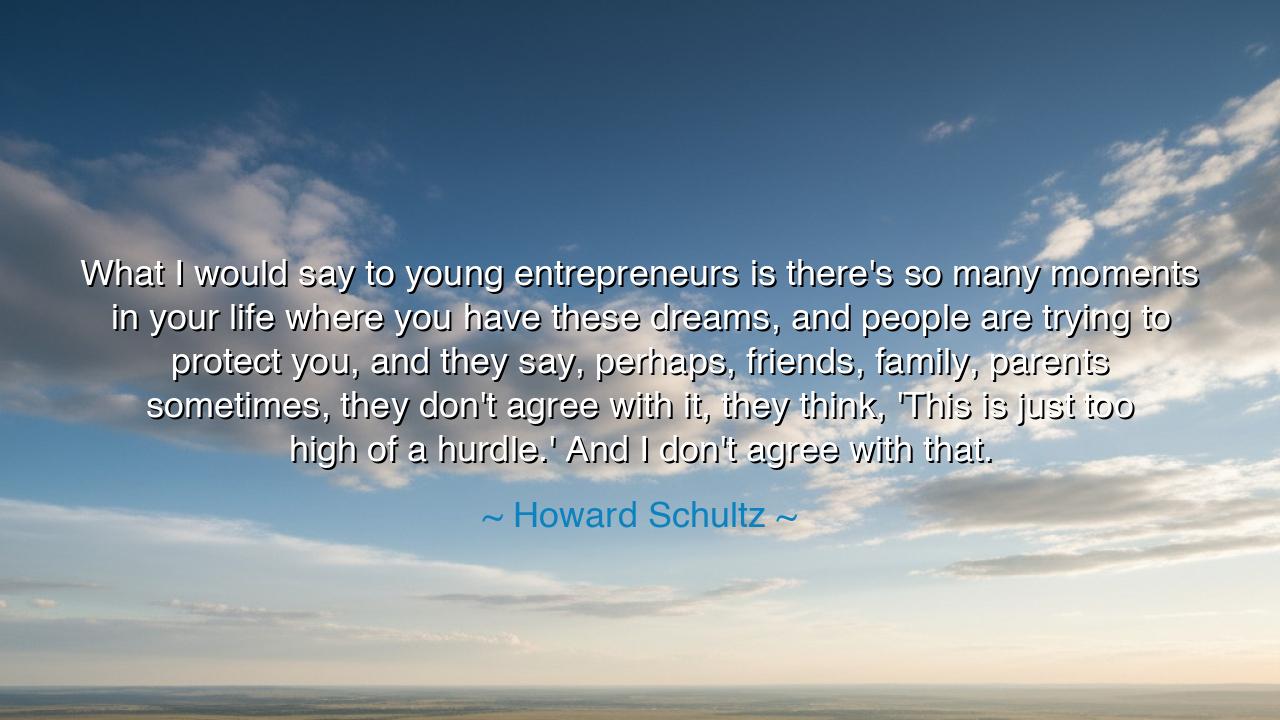
What I would say to young entrepreneurs is there's so many
What I would say to young entrepreneurs is there's so many moments in your life where you have these dreams, and people are trying to protect you, and they say, perhaps, friends, family, parents sometimes, they don't agree with it, they think, 'This is just too high of a hurdle.' And I don't agree with that.






When Howard Schultz said, “What I would say to young entrepreneurs is there's so many moments in your life where you have these dreams, and people are trying to protect you, and they say, perhaps, friends, family, parents sometimes, they don't agree with it, they think, 'This is just too high of a hurdle.' And I don't agree with that,” he was not merely speaking as the builder of a business empire — he was speaking as a man who had stared into the face of limitation and refused to bow. These words carry the spirit of defiance that defines every great dreamer, every soul who dares to climb when others say, “It is too high.” Schultz speaks for all who have been told to be safe when their hearts long to soar.
Born into poverty in Brooklyn, Schultz grew up in a home where security was sacred and risk was feared. His father worked hard yet was often defeated by circumstance, and young Howard learned early the cost of fragility. But from those humble beginnings came a fire — a vision not just of success, but of possibility. When he first encountered a small coffee shop called Starbucks, he saw not a local business, but a dream waiting to bloom. He believed that coffee could become a ritual of connection, community, and warmth. Yet many around him doubted his vision; they said it was foolish, that Americans would never pay a premium for such a thing. And so, he faced what he describes in this quote — the gentle discouragement of love, the well-meaning protection that kills too many dreams before they can take root.
There is a profound truth in his words: that the greatest barriers to destiny are not always born from enemies, but from those who love us. Parents, friends, teachers — they fear for our safety and warn us against pain, risk, and disappointment. Their caution is born of care, but it can become a chain if we mistake it for truth. Schultz reminds us that even good intentions can stand between a person and their calling. To live greatly, one must learn when to listen to love, and when to rise above it. The ancients would say: “He who would sail beyond the horizon must first forgive the voice that tells him to stay ashore.”
This struggle is as old as time. Consider Christopher Columbus, who was told by scholars and kings alike that his vision of crossing the Atlantic was madness. Or Joan of Arc, whose divine calling was doubted by the very priests who served the same God she invoked. These figures, like Schultz, were met not with hatred but with disbelief — the disbelief that what had never been done could ever be done. Yet, because they refused to bow to doubt, they changed the shape of history. Every generation needs such souls — those who hear the warnings of caution and still say, “I do not agree with that.”
Schultz’s words also speak to the inner voice of self-doubt, which is often disguised as logic. The entrepreneur, the artist, the visionary — each must battle the whisper that says the mountain is too high, the dream too fragile, the path too uncertain. But as Schultz teaches, hurdles are not walls; they are the measure of how much faith we are willing to place in our own strength. The higher the obstacle, the greater the transformation that comes from overcoming it. To surrender before the climb is to live half a life — safe, but hollow. To attempt, even and especially when others doubt, is to honor the divine spark of courage within us.
In the story of Starbucks, Schultz proved his belief in the impossible. He faced rejection after rejection — over two hundred investors turned him away. Yet he persisted. He took the risk, opened his heart, and built not just a company but a movement — one that redefined global culture. His triumph stands as a testament to what happens when faith outlasts fear, and when vision refuses to shrink beneath the expectations of others. The world often rewards not those who are most protected, but those who are most willing to stand unshielded before the storm.
And so, the lesson is this: trust the voice within that burns brighter than the warnings without. Listen respectfully to those who love you, but do not let their fear become your fate. The universe favors the bold, the persistent, the ones who dare to say, “I do not agree with that.” Every great life begins with a moment of disobedience — not of rebellion against love, but of loyalty to purpose. So dream, and dream beyond reason. When others tell you the hurdle is too high, look upward, plant your feet firmly, and leap — for it is on the other side of that leap that destiny waits.






AAdministratorAdministrator
Welcome, honored guests. Please leave a comment, we will respond soon